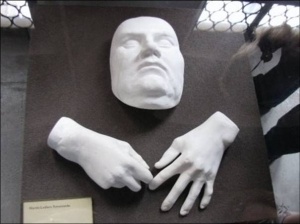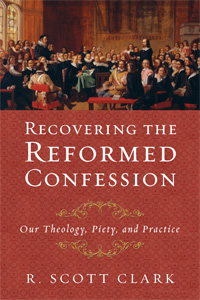Bob Godfrey is on Office Hours, this time to discuss Hebrews 3:7–4:13. We’re discussing how Hebrews treats the problem of apostasy and hypocrisy, Scripture, and the Sabbath. These are thorny questions but Bob is very helpful in walking us through them. I hope you’ll listen . . . Continue reading →
New: Riddlebarger on 1Corinthians
Kim Riddlebarger has a new commentary on 1Corinthians forthcoming in the Lectio Continua series. He’s got the information on the RB. The Lectio Continua series is a new exegetical, Reformed commentary, on Scripture, edited by Jon Payne, pastor of Grace PCA in . . . Continue reading →
Resources on Understanding the Differences Between the Lutheran and Reformed Traditions
A friend posted something on Twitter this AM that reminded me how little the two traditions understand each other today. In the 16th and 17th centuries our traditions were involved in intense, frequent discussions and interaction and we understood each other more . . . Continue reading →
Brothers We Are Not Perfectionists
Introduction In the doctrine of sanctification there are several errors to be avoided. First, let’s define our terms and understand what the basic biblical (and confessional Reformed) doctrine of sanctification is. The verb “to sanctify” is Latin. It is the word from . . . Continue reading →
Office Hours: Joel Kim on Hebrews 3:1-6
Joel Kim is back for another episode of Office Hours, this time to discuss Hebrews 3:1-6. Joel is Assistant Professor of New Testament at Westminster Seminary California. In this episode we discussed the superiority of Jesus to Moses and what it means to fix . . . Continue reading →
What Does Rome Mean By Papal Infallibility?
The impending arrival of the Bishop of Rome to Twitter (@Pontifex) has raised the question of papal infallibility in a new, late modern way. This seems like a good time to remind ourselves of what Rome teaches about the infallibility of papal . . . Continue reading →
Who Are the True Catholics? (5a): Justification
Part 4: Who are the True Catholics (4): Assurance of Salvation In theological terms, there were two principles of the sixteenth-century Protestant Reformation: the formal principle and the material principle. The first, the formal principle, was the doctrine that Scripture is the . . . Continue reading →
Protestants Looking For Authority Convert to Rome
As part of trend, which has been observed here since October 2009, a retired Episcopal minister, Larry Gipson, has become a Roman priest. Gipson was formerly the rector of the USA’s largest Episcopal church. He’s in process of becoming a Roman priest . . . Continue reading →
Would You Give Up the Means of Grace for 500 Million Dollars?
The recent Powerball lottery pay-off was 588 million dollars. This prompted the hosts of a Lincoln (Neb) sports-talk show, following Dan Patrick, to ask the following question: would you give up watching sports forever for $500,000,000? The guest to whom they asked . . . Continue reading →
Confessional Reformed Devotional Literature?
In Recovering the Reformed Confession I defined the the “Reformed Confession” both narrowly (referring to the confessional documents adopted by the churches) and broadly referring to the theology, piety, and practice in, with, and around the confessions themselves. Subsequent discussions here and . . . Continue reading →
Blame it on the Reformation: Hart Replies to Gregory
I have been in conversations before with Roman Catholics about a sacramental view of the universe and it still leaves be flummoxed. It is akin to the Reformed w-w phenomenon where Christianity is nothing unless it provides a comprehensive account of everything. . . . Continue reading →
Re-Thinking the Crusades
The History Channel reminds us that on this date in 1095, Pope Urban II ordered the First Crusade. Prior to 1979 it was more difficult than it is today to imagine such a thing, a leader of a world religion ordering a . . . Continue reading →
Reading Authors and Texts in Context
I was alerted to this new volume by Daniel Swift and wanted to let you know about it for two reasons: 1) It’s an interesting topic in which two groups of readers have an interesting, those interested in the history of worship . . . Continue reading →
The Law Written on Their Hearts
Paul Bloom, in the NY Times Magazine (May 5, 2010), writes: A growing body of evidence, though, suggests that humans do have a rudimentary moral sense from the very start of life. With the help of well-designed experiments, you can see glimmers . . . Continue reading →
Deconstructing Puritanism
In “Beware the Puritan Paralysis” Trevin Wax cautions us about a tendency to introspection. He makes a very important point: Too many times, we dress up our introspection with flowery terms like “accountability” and “mortification” and “gospel-centered change.” Even if all these . . . Continue reading →
So Many Reasons
On this day we rightly pause to give thanks for the innumerable blessings we have received, both those common to all image bearers and those saving benefits particular to believers. Chief among the latter are saving faith and Spirit-wrought union with Christ . . . Continue reading →
Office Hours: Joel Kim on Hebrews 2:14-18
Joel Kim spent some time in the office to discuss Hebrews 2:14–18. Joel is Assistant Professor of New Testament at Westminster Seminary California. In this episode we discussed what it means for Jesus to “share in flesh and blood” and to be delivered from . . . Continue reading →
The Reformation Lives…In Italy
When we think of Italy we probably don’t think about a growing, confessional Reformed church but it exists. The Rev Andrea Ferrari not has the coolest name in the Western world but he is the minister. He was ordained in 2010 and . . . Continue reading →
Was Calvin A Homosexual Convict?
Recently a correspondent wrote to ask about the following: “An interesting story: in 1527, the year he was 18, Calvin was arrested, tried, and convicted of homosexual activity. Instead of being executed (per French law at the time), he was branded with . . . Continue reading →
Unintended Reformulation?
Brad Gregory is a well-respected Reformation historian. He has taught at Stanford and now teaches at Notre Dame. His study of martyrdom in the Reformation period is highly regarded. He has produced a new work which is receiving a good deal of . . . Continue reading →
















